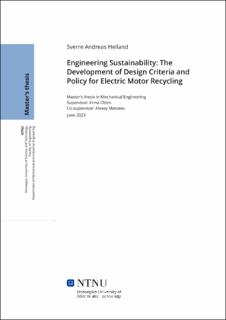| dc.contributor.advisor | Anna Olsen | |
| dc.contributor.advisor | Alexey Matveev | |
| dc.contributor.author | Helland, Sverre Andreas | |
| dc.date.accessioned | 2023-09-26T17:19:37Z | |
| dc.date.available | 2023-09-26T17:19:37Z | |
| dc.date.issued | 2023 | |
| dc.identifier | no.ntnu:inspera:146039120:46090207 | |
| dc.identifier.uri | https://hdl.handle.net/11250/3092144 | |
| dc.description.abstract | Denne masteroppgaven fremhever betydningen av bærekraftig design i sammenheng med resirkulering av elektriske motorer. Gitt det økende antallet av elektriske motorer, fokuserer denne studien på utviklingen av designkriterier for resirkulering og etableringen av en resirkuleringspolicy, med et spesielt fokus på Alva Industries.
Metodene som ble benyttet inkluderer en omfattende litteraturstudie, bedriftsundersøkelser, intervjuer og en detaljert case-studie hos Stena Recycling. Analysen av informasjonen hentet fra disse kildene gir innsikt i dagens resirkuleringsprosess og identifiserer utfordringene og mulighetene forbundet med bærekraftig håndtering av elektriske motorer ved slutten av deres levetid. På grunnlag av disse funnene ble det utviklet en policy for resirkulering og gjenbruk. En litteraturgjennomgang av sammensetningsteknikker og materialer dannet grunnlaget for de etablerte designkriteriene.
Resultatene fra denne oppgaven har resultert i en policy som Alva Industries kan benytte for å øke oppmerksomheten rundt resirkulering og iverksette tiltak for å etablere en robust resirkuleringskultur. De etablerte designkriteriene kan bidra til informerte designvalg for fremtidige elektriske motorer, med mål om å effektivisere og øke resirkulerbarheten. Potensialet for fremtidig forskning er også identifisert, som for eksempel utforskning av nye materialer og monteringsmetoder for implementering i Alva Industries' elektriske motorer.
Policyen og case-studien illustrerer resirkuleringsmulighetene og kan hjelpe bedrifter med å oppdage ukjente resirkuleringsmuligheter. Studien bidrar teoretisk til forståelsen av den nåværende resirkuleringsprosessen for elektriske motorer og hvordan den kan forbedres.
Studien har imidlertid noen begrensninger. Tilgangen til detaljert informasjon om design og spesifikk epoxy-resin-blanding var begrenset på grunn av immaterielle rettigheter, noe som gjorde sammenligning med potensielle alternativer utfordrende. Det var også utfordrende å finne relevante kostnadsdata, spesielt knyttet til produksjon og transport av resirkulerte og råmaterialer.
Samlet sett baner denne studien vei mot en mer bærekraftig fremtid for produksjonen av elektriske motorer ved å fremheve betydningen av bærekraftig design og resirkulering. Det er et håp om at funnene vil inspirere ytterligere forskning og innovasjon innen dette feltet. | |
| dc.description.abstract | This master's thesis underscores the importance of sustainable design in relation to the recycling of electric motors. Given the escalating number of electric motors, this study focuses on the development of recycling-oriented design criteria and the establishment of a recycling policy, with particular emphasis on Alva Industries.
The methods employed include a comprehensive literature review, business surveys, interviews, and a detailed case study at Stena Recycling. The analysis of the information gathered from these sources provides insight into the current recycling process and identifies the challenges and opportunities associated with the sustainable management of end-of-life electric motors. Based on these findings, a policy for recycling and reuse was developed. A literature review of assembly techniques and materials formed the basis for the established design criteria.
The results of this work have resulted in a policy that Alva Industries can use to raise awareness around recycling and initiate measures to establish a robust recycling culture. The established design criteria can contribute to informed design choices for future electric motors, with the goal of optimizing and increasing recyclability. The potential for future research is also identified, such as exploring new materials and assembly methods for implementation in Alva Industries' electric motors.
The policy and case study illustrates recycling possibilities and can assist companies in discovering unknown recycling opportunities. The study theoretically contributes to the understanding of the current recycling process for electric motors and how it can be improved.
However, the study has some limitations. Access to detailed information on design and a specific epoxy resin blend was limited due to intellectual property rights, making comparisons with potential alternatives challenging. Finding relevant cost data, especially related to the production and transportation of recycled and raw materials was also challenging.
Overall, by highlighting the significance of environmentally friendly design and recycling, this study establishes the way for the electric motor manufacturing industry that is more sustainable in the future. The results may encourage additional study and development in this area. | |
| dc.language | eng | |
| dc.publisher | NTNU | |
| dc.title | Engineering Sustainability: The Development of Design Criteria and Policy for Electric Motor Recycling | |
| dc.type | Master thesis | |
